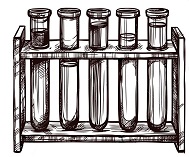COCI '21 Contest 5 #1 Kemija
View as PDF
Fran didn't pay attention in school during chemistry class and now he needs your help in doing his homework. His homework consists of
A chemical equation has a left side and a right side. The left side contains chemical formulas of the initial molecules, while the right side contains chemical formulas of the product molecules. The left and the right sides of the equation are separated by an arrow (characters ->). Different molecules appearing on the left or the right side are separated by a +.
Molecules are substances made from atoms, tiny particles which are denoted with capital letters of the Latin alphabet (for the purposes of this task). The formula of a molecule is written by listing the labels of all the different atoms which make up the molecule. If a molecule has multiple instances of some atom, then the number of occurrences of this atom is written after the atom in the formula. For example, AC4B is a formula for a molecule which has one atom A, C and one atom B. If on one side of the equation a molecule appears more than once, then this number of occurrences is written as a coefficient in front of the formula. For example, 3AC4B denotes AC4B, for a total of A, C and B.
A chemical equation is said to be balanced if the right side and the left side contain an equal number of atoms of each kind. Your task is to determine whether or not each of the
Input Specification
The first line contains a positive integer
Each equation consists of at most
Output Specification
For each of the DA if it is balanced, and NE if it is not, in separate lines.
Constraints
| Subtask | Points | Constraints |
|---|---|---|
| No chemical reaction has a number in it. | ||
| No numbers appear within any formulas for molecules. | ||
| No additional constraints. |
Sample Input 1
3
A+B->AB
AB+CD->AC+DB
AB+B->ABSample Output 1
DA
DA
NESample Input 2
2
2AB+A->3AB
2AB+2AC+2BC->4ABCSample Output 2
NE
DASample Input 3
4
2H2O+2CO2->2H2CO3
H2SO4->H2O4
NH3+H2SO4->NH4SO4
CH4+2O2->CO2+2H2OSample Output 3
DA
NE
NE
DAExplanation for Sample Output 3
First equation: both sides have H, C and O so the answer is DA.
Second equation: the left side has a single S atom, but the right side has none so the answer is NE.
Third equation: the left side has H, but the right side has 4 so the answer is NE.
Forth equation: both sides have H, one atom C and O so the answer is DA.
Comments